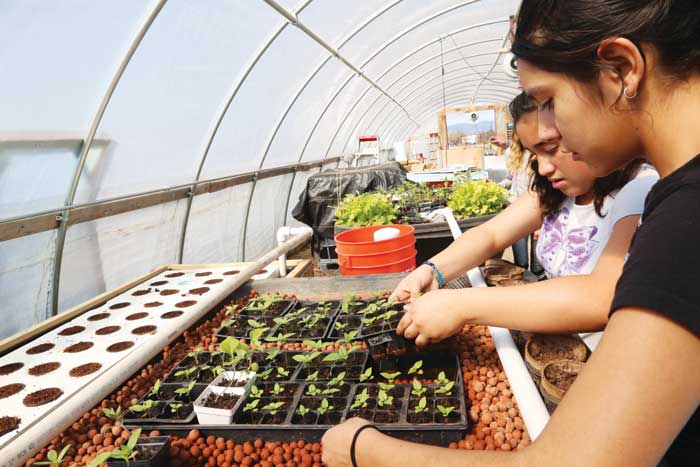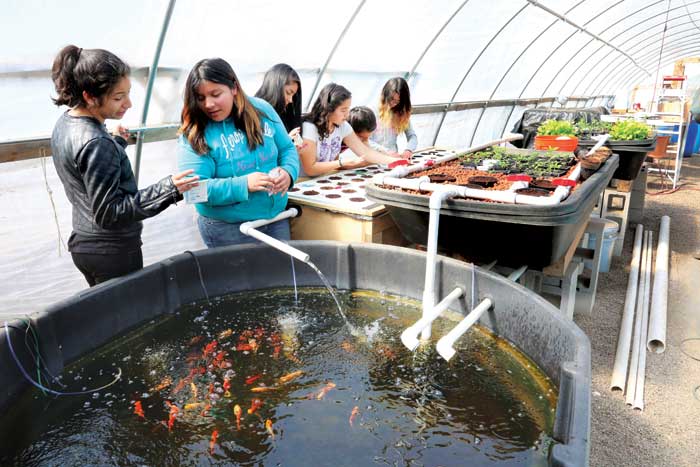
As part of biology and earth science courses, students from Escuela Tlatelolco School learn about aquaponics at the Urban Farm. Later this summer, the farm will offer workshops for the community on sustainable agriculture.
Urban farming is all the rage these days. Of course, having a garden in the backyard is nothing new, but the enthusiasm for it is growing like a weed—and the outcome is more like lettuce and tomatoes.
With a mission to “provide agricultural and environmental education to urban children, youth and their families,” The Urban Farm at Stapleton has been on the bandwagon for more than 20 years. This summer brings new opportunities for people to learn how to grow their own food and to see what life is like on the farm while living in the city.
One of The Urban Farm’s best teaching tools is its aquaponics project. Rick Garcia, farm manager, has worked with volunteers and students from area schools to create a 300-gallon system in their “hoop house,” a greenhouse of sorts on the property with two other systems in the works, including a 1500-gallon one. “Aquaponics” refers to a closed system in which fish in one container (including tilapia and catfish, which can later be harvested as a protein source), generate nutrient-rich wastewater which is pumped and circulated into another container to water and feed plants including lettuce, cucumbers, herbs, strawberries and tomatoes. Another pump pushes the water through the plants’ roots and soil, providing the fish with clean water. The circulating water is constantly being aerated so that in a closed system, the fish receive the oxygen they need and the plants get the carbon dioxide they need. The aquaponics system is inherently organic. “You can’t do anything but have organic food because you can’t add anything to your fish tank or you’ll kill the fish,” explains Garcia.
The fish and their waste nutrients is what differentiates this system from hydroponics where nutrients have to be added to the water. For those who do not want fish to eat at the end of the season, hearty goldfish, such as those meant for ponds, are a good alternative that kids enjoy watching.

Students learn how to maintain an aquaponics system.
The main reason for creating an aquaponics system is water conservation. “In an area like Denver, which is a high desert where we are lacking water, this is a way to conserve water and grow your own food, getting your vegetables throughout the season and your protein too,” explains Garcia.
People can volunteer to help Garcia maintain the current 300-gallon system and build the other two, learning how to create their own system in the process.
In Garcia’s work with schools, many of whom include Urban Farm visits in their biology and earth science curriculums, students rotate between working with the aquaponics system, doing chores around the farm and learning about horses’ physiology, behavior and how to ride them. “We don’t just put kids to work,” says Garcia. “We always have an educational component.”
It isn’t enough to just teach people how to grow their own food. Garcia wants people to want to eat the food they are growing. To that end, The Urban Farm is planning to bring in area chefs who will teach people how to prepare what they are growing. “You can learn how to grow a food, but if you don’t know how to prepare it, what’s the point? Education is tantamount to everything regarding growing food right now—you have to learn how to compost, when to put the seeds in, how much to water, how much sunlight and ultimately how to eat it,” says Garcia.
The Urban Farm has community garden plots for those who want to garden in a farm setting. A $60 family membership fee, which supports the farm, includes horse rides, camps and extended visiting hours. Every Saturday, The Urban Farm offers tours and a chance to explore the farm from 10am–1pm, year-round for a donation of $5 per person.
At the beginning of October, the farm will host Farm Fest, a weekend of music, food, pony rides, a rodeo show, horse shows and workshops on aquaponics, composting and sustainable agriculture.
It’s all part of Garcia’s efforts through The Urban Farm “to get people on the farm, knowing where their food comes from.”
Anyone interested in learning about aquaponics is welcome to contact Rick Garcia directly at 720.495.6876. To learn more about The Urban Farm, visit www.TheUrbanFarm.org or call 303.307.9332.




0 Comments